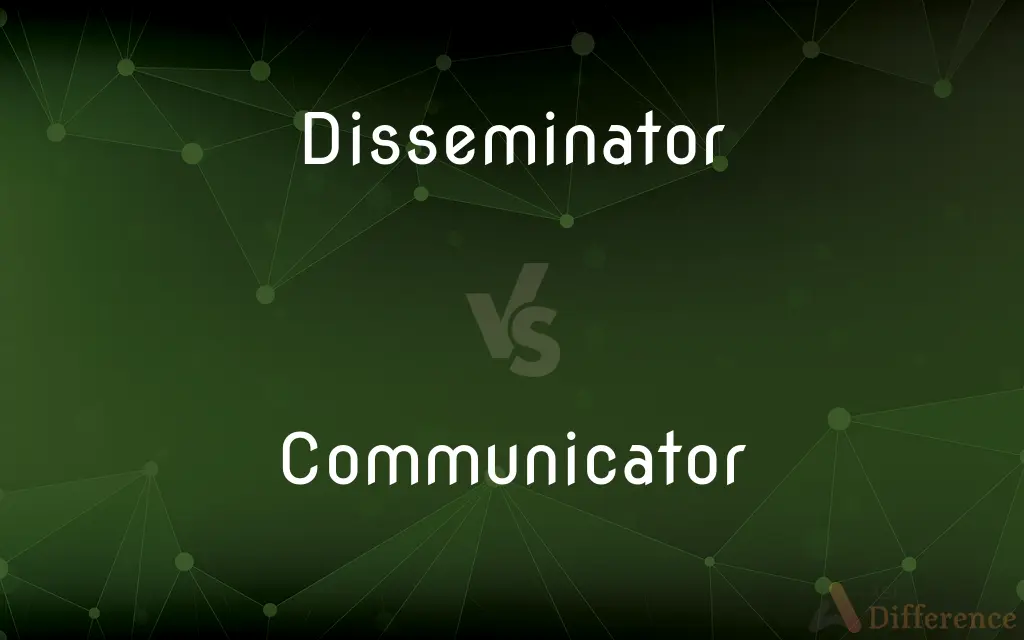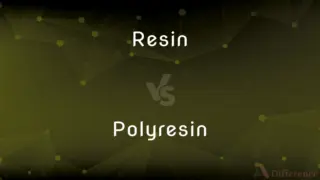Disseminator vs. Communicator — What's the Difference?
By Fiza Rafique & Maham Liaqat — Updated on April 16, 2024
Disseminators distribute information widely, often without interaction, while communicators engage in two-way exchanges to share ideas effectively.

Difference Between Disseminator and Communicator
Table of Contents
ADVERTISEMENT
Key Differences
A disseminator primarily focuses on spreading information to a broad audience, often using channels that allow for one-way communication. This role is common in fields like journalism or marketing where the goal is to inform or persuade on a large scale. On the other hand, communicators emphasize interaction and feedback, which is essential in roles requiring dialogue and understanding, such as teaching or negotiation.
Disseminators often utilize mass media tools like press releases, newsletters, or social media posts to reach their audience. These tools are effective for broadcasting information quickly and efficiently. Whereas communicators might use the same media, their approach includes opportunities for engagement through comments, discussions, or direct messaging, fostering a two-way communication stream.
In the role of a disseminator, the focus is more on the message itself rather than the audience's reaction to it. This approach is useful in situations where the objective is to inform or announce rather than to engage. On the other hand, communicators pay close attention to how their message is received and are prepared to adapt their message based on feedback, which is crucial for effective interpersonal communication.
While disseminators are often seen as informers or announcers, communicators are typically viewed as facilitators or collaborators. This distinction highlights the disseminator’s role in one-to-many communication versus the communicator’s role in facilitating understanding and interaction in a more personal, often one-to-one or small group setting.
Disseminators may not require immediate feedback from their audience to consider their communication successful. Their success is often measured by the reach of their message and its impact, such as increased awareness or changed perceptions. Conversely, communicators measure success by the clarity of understanding achieved and the effectiveness of the interaction, often requiring immediate and clear feedback to gauge effectiveness.
ADVERTISEMENT
Comparison Chart
Communication Flow
One-way
Two-way
Primary Goal
Spread information broadly
Facilitate understanding and interaction
Tools Used
Mass media, press releases, social media
Personal communication, interactive platforms
Feedback Importance
Less emphasis on receiving feedback
High emphasis on interaction and feedback
Typical Settings
Journalism, marketing
Education, counseling, negotiation
Compare with Definitions
Disseminator
A person or entity that spreads information widely.
The government acted as a disseminator of crucial health guidelines during the pandemic.
Communicator
A professional involved in media or public relations.
As a communicator, his role was to manage the company's external communications.
Disseminator
An agent that distributes resources or materials.
The non-profit organization functions as a disseminator of educational materials in rural areas.
Communicator
A person who conveys information or expresses ideas effectively.
A skilled communicator, the teacher was able to engage her students in meaningful discussions.
Disseminator
Someone who propagates ideas or theories.
The philosopher was known as a disseminator of complex existential ideas.
Communicator
Someone skilled in storytelling or presenting.
The CEO is an excellent communicator, known for his compelling corporate presentations.
Disseminator
A system used to release information systematically.
The software was developed to act as a disseminator of real-time financial data.
Communicator
A device that enables transmission of messages.
Astronauts use a specialized communicator to contact mission control.
Disseminator
A tool or mechanism that broadcasts data or signals.
Social media platforms serve as powerful disseminators of both news and misinformation.
Communicator
An individual who facilitates dialogue or mediation.
The counselor is trained as a communicator to help resolve conflicts amicably.
Disseminator
To scatter widely, as in sowing seed.
Communicator
One that communicates
An effective communicator of new ideas.
Disseminator
To spread abroad; promulgate
Disseminate news.
Communicator
An electronic device enabling individuals with physical disabilities to communicate through LED displays, printed or electronic messages, or synthetic speech.
Disseminator
To become diffused; spread.
Communicator
Someone who, or something that communicates.
We'll let Nick give the presentation next week: he's a good communicator.
Disseminator
One who, or that which, disseminates.
Communicator
Any of several electronic devices that allow people with various disabilities to communicate via displays or artificial speech.
Disseminator
One who, or that which, disseminates, spreads, or propagates; as, disseminators of disease.
Communicator
(science fiction) A usually portable communications device.
Disseminator
Someone who spreads the news
Communicator
One who communicates.
Communicator
A person who communicates with others
Common Curiosities
What is the main focus of a disseminator?
The main focus of a disseminator is to distribute information as widely and efficiently as possible.
Can someone be both a disseminator and a communicator?
Yes, roles often overlap where one might need to disseminate information broadly but also engage interactively with certain audiences.
Which settings are typical for disseminators?
Typical settings include media, public relations, and large-scale marketing campaigns.
What is the significance of the communication flow in their roles?
The flow of communication defines their roles: one-way for disseminators to spread information, two-way for communicators to ensure engagement.
How does a communicator differ from a disseminator in terms of feedback?
A communicator places high importance on feedback to ensure mutual understanding, while a disseminator may not seek feedback actively.
What settings are ideal for communicators?
Communicators thrive in settings like education, counseling, corporate leadership, and any role that requires negotiation.
What challenges do communicators face?
Communicators often face challenges in ensuring clear understanding, overcoming language or cultural barriers, and managing interpersonal dynamics.
How can a disseminator improve their effectiveness?
By using diverse channels to reach broader audiences and ensuring the content is engaging and accessible.
How do communicators use technology differently than disseminators?
Communicators use technology to facilitate interactive exchanges, such as video conferencing or interactive web platforms, while disseminators use it for broad message distribution.
What challenges do disseminators face in the digital age?
Challenges include information overload, maintaining credibility, and navigating misinformation.
What tools are commonly used by disseminators?
Disseminators commonly use tools like newsletters, press releases, and social media platforms.
What skills are essential for an effective communicator?
Key skills include active listening, clear articulation, empathy, adaptability, and the ability to engage with feedback.
How is success measured differently between a disseminator and a communicator?
Success for a disseminator is measured by reach and impact, whereas for a communicator, it is measured by the clarity of understanding and interaction.
What techniques can communicators use to enhance their effectiveness?
Techniques include using feedback loops, engaging storytelling, and adapting messages based on audience responses.
Why might a company prefer a disseminator over a communicator for certain tasks?
A company may prefer a disseminator when the goal is to inform a large audience quickly without the need for direct engagement.
Share Your Discovery

Previous Comparison
Manichaeism vs. Zoroastrianism
Next Comparison
Resin vs. PolyresinAuthor Spotlight
Written by
Fiza RafiqueFiza Rafique is a skilled content writer at AskDifference.com, where she meticulously refines and enhances written pieces. Drawing from her vast editorial expertise, Fiza ensures clarity, accuracy, and precision in every article. Passionate about language, she continually seeks to elevate the quality of content for readers worldwide.
Co-written by
Maham Liaqat















































